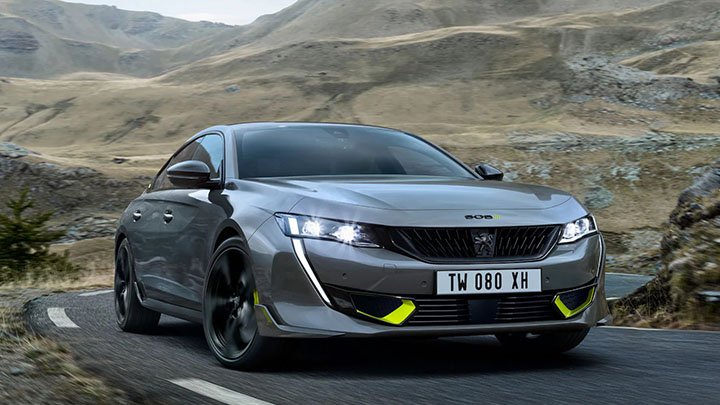Next Peugeot 508 to rival Tesla Model 3 as radical electric saloon

The Peugeot 508 is set to be reinvented for an electric-only third generation as the brand prepares to embark on its most drastic and wide-reaching shake-up in decades.
From 2025, the French firm’s electric cars will switch from legacy PSA Group architecture to the new-era Stellantis STLA modular EV platforms that are being introduced to Peugeot and its 13 sibling brands.
As previewed by the stunning Peugeot Inception concept last month, these platforms will bring about a step change in the technical make-up of Peugeot’s EVs, introducing trick new wireless steering hardware, advanced autonomous driving functions, much more powerful motors and longer-range batteries with faster (and potentially wireless) charging capacity.
Peugeot was careful to clarify that it has no plans to build a production version of the Inception itself, but its sharp, squat propositions and low-slung silhouette naturally make it closest in conception to the Mk2 Peugeot 508, which has been on sale since 2018 and will therefore be due for replacement roughly when the first STLA-based EV arrives.
The 508’s future has long been uncertain as sales in the traditional D-segment saloon and estate markets have plummeted in light of increased demand for SUVs, with rivals including the Ford Mondeo, Vauxhall Insignia and Volvo S60 all recently bowing out. However, Peugeot CEO Linda Jackson said the brand has no intention of axing model lines as it reinvents itself.
Speaking at the Consumer Electronics Show in Las Vegas earlier this month, Jackson said: “We’ve got some great models, and we want to keep the same-sized range, the same number of models. So it’s all about refreshing each of our models as we come along.”
Indeed, a subsequent preview of Peugeot's next-generation EV line-up (below) looks to include a low-slung fastback in the vein of the 508, alongside successors to the Peugeot 208 and Peugeot 308 hatchbacks - as well as the trio's SUV siblings.
While the 508’s replacement is likely to keep the same name, it will be heavily restyled and subtly repositioned in a bid to bolster its popularity and link it more closely to its future stablemates, all of which will take heavy design inspiration from the Inception.
Most obviously, the 508’s successor is likely to be higher-riding in order to account for the global market shift towards crossovers but will keep its conventional saloon silhouette.
Jackson said this straddling of segments (first explored with the freshly launched Peugeot 408) will provide the best balance of efficiency and practicality for next-generation EVs.
She explained: “I don’t think anybody is saying that SUVs are going to disappear, because they’re still as popular as ever, but we’re all looking for ways to make them more aerodynamic, and therefore you start to move into slightly different silhouettes.”
Jackson acknowledged the higher driving position and enhanced ‘modularity’ offered by SUVs as chief factors in their appeal but said experimenting with new bodystyles in this segment could bring about improvements in efficiency, thereby boosting range and cutting CO2 emissions per car.
Notably, fellow Stellantis brand Vauxhall’s similarly conceived and sized Insignia will return with electric power (and more ground clearance) in around 2025, raising the possibility of it and the next 508 effectively being twinned.
Peugeot product director Jérôme Micheron summed up the company’s vision for future product segmentation concisely by saying: “There’s life besides SUVs.” He acknowledged that Peugeot is “very successful” with its 2008, 3008 and 5008 but added that “low-roof” cars such as the 208 and 308 remain strong-selling mainstays of the line-up.
“In the coming portfolio,” he said, “we will still have a balance between SUVs and other concepts. I’m not saying this is going to be exactly the Inception, but we want to have this balance.”
Q&A with Peugeot CEO Linda Jackson
Why does the Inception concept take the form of a car that you won’t build?
“What we’re saying is that all of the technologies that you’ve seen will appear on Peugeot models across the range. So, if you like, it’s a manifesto. It’s really a showcase of technologies, as opposed to simplistically saying: ‘This is a great concept and we’re going to bring it to the market.’”
Why invest in wireless charging technology when there’s no infrastructure to support it?
“We’re investing for the future. And we have to remember that the speed of development of all aspects of electrification is so rapid. We’re saying these technologies will be introduced from 2025 onwards; we’re not necessarily saying that fast charging is [coming in] exactly 2025. We need to move forward and we need to find clever, easy solutions for our customers.”
Will the Inception’s advanced technology make it even to entry-level cars?
“We need to make sure of which technologies we’re going to put on the B-segment cars, C-segment cars or whatever, and it’s really choosing and making sure that the cars we make are affordable.”
